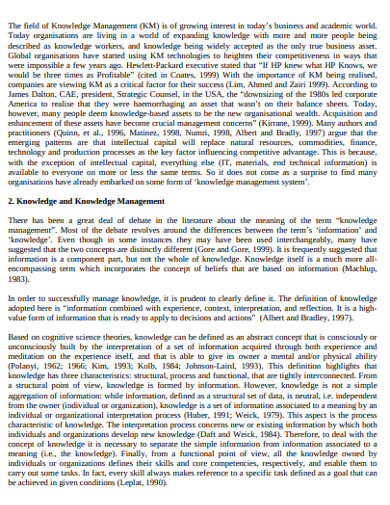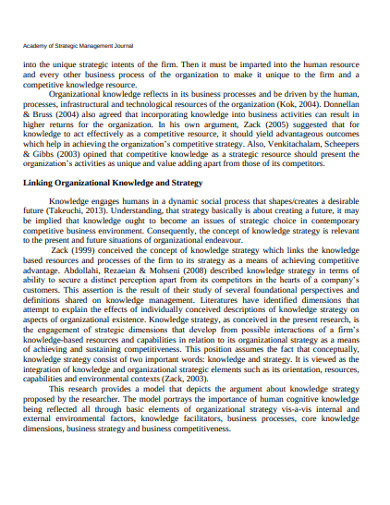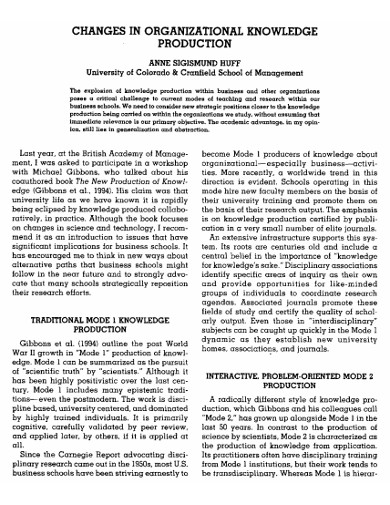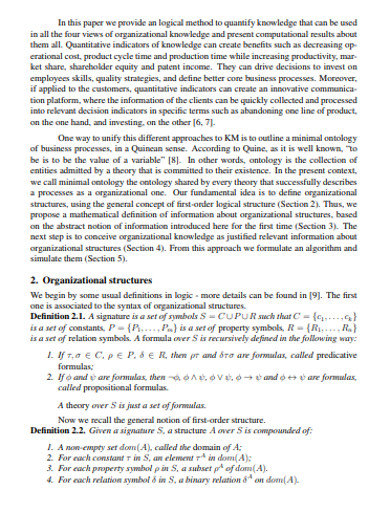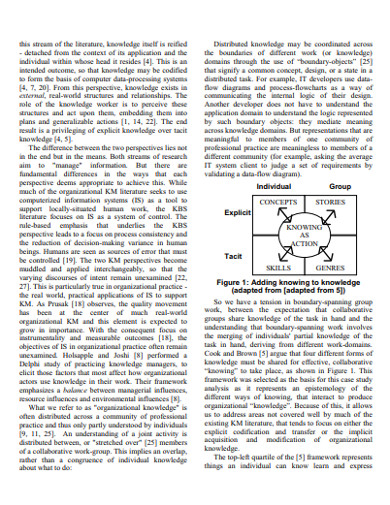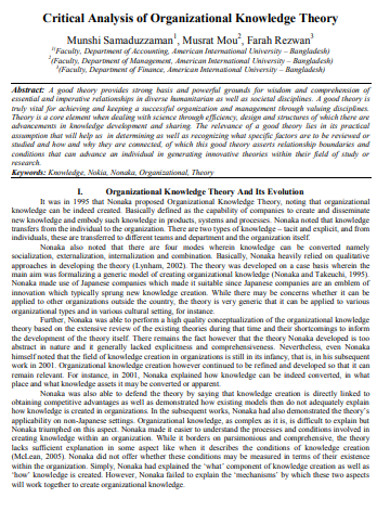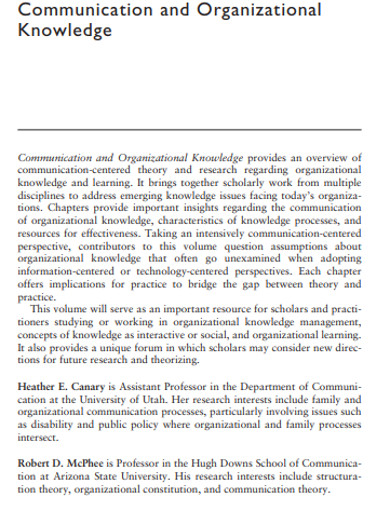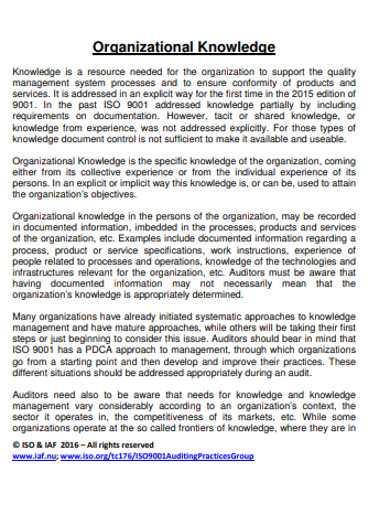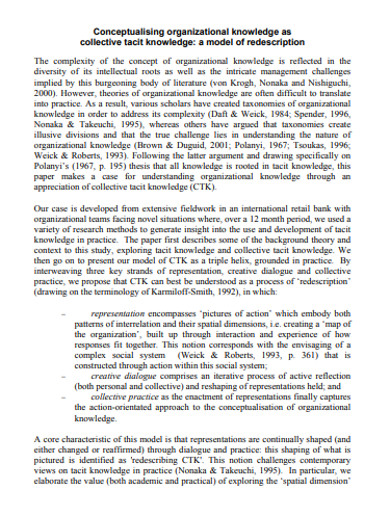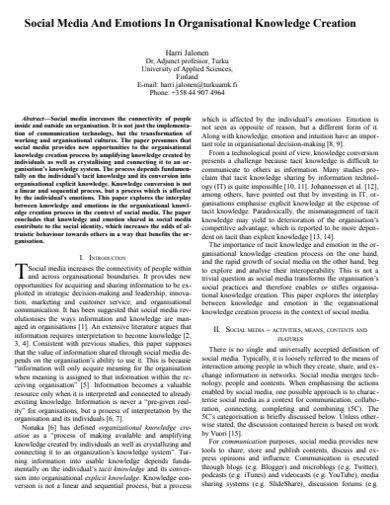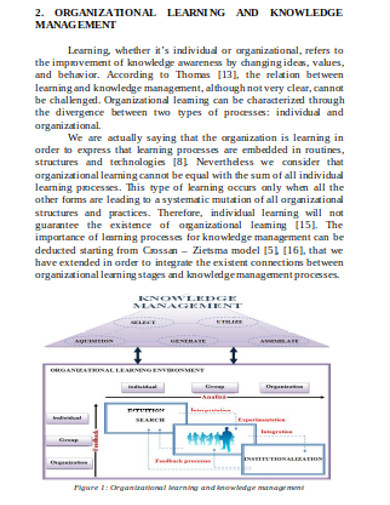10+ Organizational Knowledge Examples to Download
2014 Statista’s statistics show that in the Americas, 32% of the employees were thinking about leaving their current job. Meanwhile, 43% in the Asia-Pacific countries and 52% in EMEA were thinking the same thing. Imagine that a high number of people suddenly decide to leave your firm. The remaining people may not be able to cover all the tasks the resignees left without replacements. Assuming that you can hire an equal number of people to replace the ones who left, how long before these newbies can catch up on the expected productivity standard? With this possible scenario in mind, it is crucial to develop specific plans, such as a recruitment strategy plan. Another effective strategy that you must create is organizational knowledge management.
What is Organizational Knowledge?
Organizational knowledge is a pool of relevant expertise that you can obtain from the individuals and store within the company for proper knowledge sharing, making it a vital company asset. Through appropriate organizational knowledge management, your organization will rip the benefits that this company asset can bring, such as the competitive edge over the other players in the industry and achieving the corporate goals.
Types of Organizational Knowledge
There are many types of knowledge that you can apply to your firm, but the following are the most important ones.
Explicit Knowledge
Explicit knowledge is the knowledge that anyone can effortlessly transfer through step-by-step instructions and procedures. You can easily store this type of information in the form of policy documentation, procedure documentation, etc. An excellent example of this type of knowledge is the customer support process.
Tacit Knowledge
Some learnings and skills can be hard to transfer or share. An excellent example of this type of knowledge is web development skills. There are strategies that people in this domain can share, but it will be hard to transfer or store this type of expertise. You will need substantial experience to obtain this type of learning. Thus, you need to convert this knowledge to explicit learning to store effectively within your organization. The most common way of doing it is through Nonaka’s Socialization, Externalization, Combination, and Internalization(SECI) model.
10+ Organizational Knowledge Examples
Now you know what organizational knowledge is. Let’s dig deeper by taking a look at the following downloadable examples.
1. Organizational Knowledge Management Example
2. Organizational Knowledge and Strategy Example
3. Production Organizational knowledge Example
4. Ontology of Organizational Knowledge Example
5. Management of Distributed Organizational Knowledge
6. Critical Analysis of Organizational Knowledge Example
7. Communication and Organizational Knowledge Example
8. Sample Organizational Knowledge Example
9. Conceptualising Organizational Knowledge Example
10. Social Media and Organisational Knowledge Example
11. Organizational Learning and Knowledge Management
How to Manage Organizational Knowledge?
Your organization may have kept procedure documentation on the proper management of organizational knowledge. However, just like tacit knowledge, to make the administration more productive than before, you will need ample experience in this area. In the meantime, use the following tips to enhance your daily organizational knowledge management process.
1. Know the Basic Scope of Expertise of each Department
To effectively maintain the knowledge that your organization holds, you will need to understand what the particular team does to attain the corporate goals. Understand the set of learning of each department possesses. You should also know that organizational culture and knowledge management are more connected to each other than you think. A company’s culture is one of the factors that you must consider in maintaining organizational knowledge.
2. Determine the Risks and Gaps
At the beginning of this article, we have mentioned what could happen if a high number of people will leave your firm. To ensure a continuous business operation, identify the number of people who knows how to do a specific task. Secure a contingency plan to cover the loopholes. List down the possible risks that are relevant to your organizational knowledge. To do these things, conduct a knowledge audit. Knowledge audit may seem formal, but you can actually make it less traditional to establish a secure connection to the people within the organization. As a consultant, you should know that talking about what you know can be personal. Thus, you need to know a better way to obtain this company asset from these individuals.
3. Use the Cloud
Despite its risks, the best way to save and share information is through the internet, especially if you are running a growing company. Make the organizational knowledge more accessible by anyone within your team by using relevant digital products such as email, cloud storage and database, and file-sharing tools as part of your knowledge management framework.
4. If possible, Don’t Start from the Scratch
You can enhance the existing knowledge management structure instead. Gathering and analyzing data by creating graphs and charts can be time-consuming. Start your task by observing the current system and make the necessary improvements to save your time and effort.
There are specific measures that you need to understand to attain your organizational goals. Proper corporate knowledge management is one of the most crucial company areas of expertise that you need to learn. In this article, we have tackled some of the critical things that will guide you in managing organizational knowledge. Continue your learning process by applying the lessons that you have earned here and by noting the new things that you uncover.



